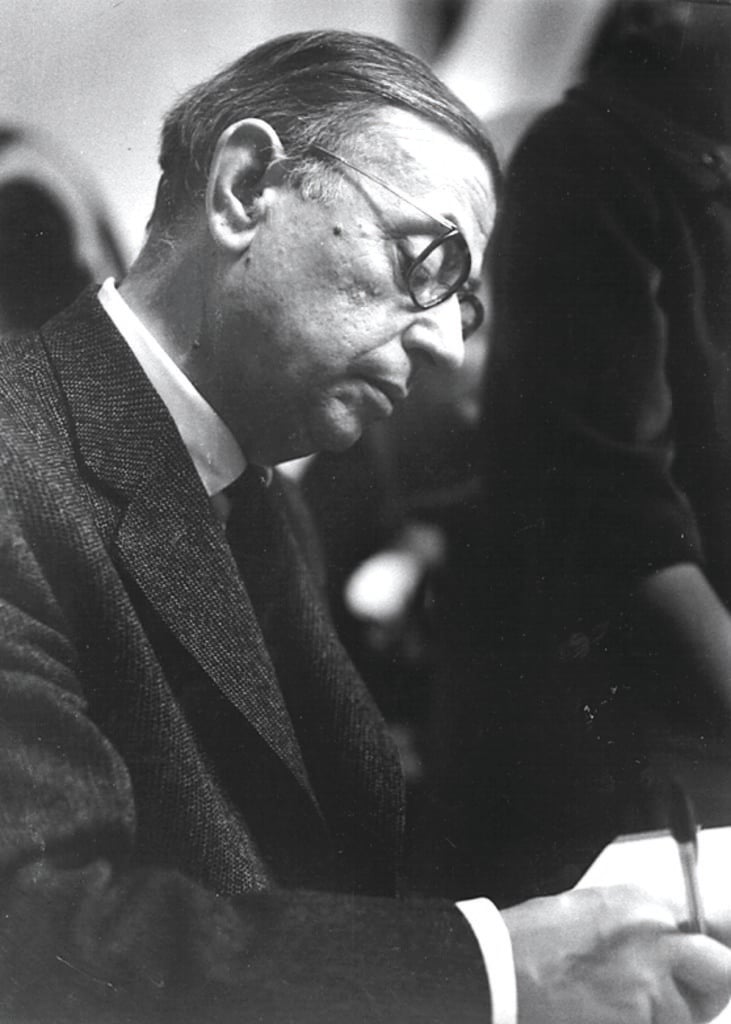Jean-Paul Sartre
Biographical

Jean-Paul Sartre, (1905-1980) born in Paris in 1905, studied at the École Normale Supérieure from 1924 to 1929 and became Professor of Philosophy at Le Havre in 1931. With the help of a stipend from the Institut Français he studied in Berlin (1932) the philosophies of Edmund Husserl and Martin Heidegger. After further teaching at Le Havre, and then in Laon, he taught at the Lycée Pasteur in Paris from 1937 to 1939. Since the end of the Second World War, Sartre has been living as an independent writer.
Sartre is one of those writers for whom a determined philosophical position is the centre of their artistic being. Although drawn from many sources, for example, Husserl’s idea of a free, fully intentional consciousness and Heidegger’s existentialism, the existentialism Sartre formulated and popularized is profoundly original. Its popularity and that of its author reached a climax in the forties, and Sartre’s theoretical writings as well as his novels and plays constitute one of the main inspirational sources of modern literature. In his philosophical view atheism is taken for granted; the “loss of God” is not mourned. Man is condemned to freedom, a freedom from all authority, which he may seek to evade, distort, and deny but which he will have to face if he is to become a moral being. The meaning of man’s life is not established before his existence. Once the terrible freedom is acknowledged, man has to make this meaning himself, has to commit himself to a role in this world, has to commit his freedom. And this attempt to make oneself is futile without the “solidarity” of others.
The conclusions a writer must draw from this position were set forth in “Qu’est-ce que la littérature?” (What Is Literature?), 1948: literature is no longer an activity for itself, nor primarily descriptive of characters and situations, but is concerned with human freedom and its (and the author’s) commitment. Literature is committed; artistic creation is a moral activity.
While the publication of his early, largely psychological studies, L’Imagination (1936), Esquisse d’une théorie des émotions (Outline of a Theory of the Emotions), 1939, and L’Imaginaire: psychologie phénoménologique de l’imagination (The Psychology of Imagination), 1940, remained relatively unnoticed, Sartre’s first novel, La Nausée (Nausea), 1938, and the collection of stories Le Mur (The Wall and other Stories), 1938, brought him immediate recognition and success. They dramatically express Sartre’s early existentialist themes of alienation and commitment, and of salvation through art.
His central philosophical work, L’Etre et le néant (Being and Nothingness), 1943, is a massive structuralization of his concept of being, from which much of modern existentialism derives. The existentialist humanism which Sartre propagates in his popular essay L’Existentialisme est un humanisme (Existentialism is a Humanism), 1946, can be glimpsed in the series of novels, Les Chemins de la Liberté (The Roads to Freedom), 1945-49.
Sartre is perhaps best known as a playwright. In Les Mouches (The Flies), 1943, the young killer’s committed freedom is pitted against the powerless Jupiter, while in Huis Clos (No Exit), 1947, hell emerges as the togetherness of people.
Sartre has engaged extensively in literary critisicm and has written studies on Baudelaire (1947) and Jean Genet (1952). A biography of his childhood, Les Mots (The Words), appeared in 1964.
This autobiography/biography was written at the time of the award and first published in the book series Les Prix Nobel. It was later edited and republished in Nobel Lectures. To cite this document, always state the source as shown above.
Jean-Paul Sartre died on April 15, 1980.
Nobel Prizes and laureates
Six prizes were awarded for achievements that have conferred the greatest benefit to humankind. The 14 laureates' work and discoveries range from quantum tunnelling to promoting democratic rights.
See them all presented here.
